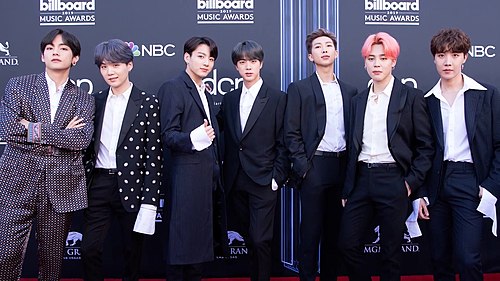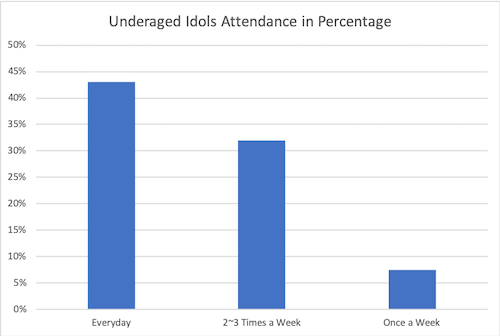
BTS’s success does not seem to have ended as one-hit-wonders. The newly released “On” captured an unprecedented position, coming in at No.4 on the Billboard Hot 100 Chart. Due to BTS’s success, Korean idol groups now represent Hallyu (Korean Wave), and their influence is getting ever stronger with the help of social media platforms such as Youtube. Behind such success, however, idol trainees and unpopular idol groups who are trying to become the next BTS are struggling through the harsh realities of the industry. The Sungkyun Times (SKT) now focuses on the difficulties those trainees, and a majority of not yet popular idol groups face.

The Reality
0.01 Percent
It is quite well-known that K-pop has a tremendous economic effect. According to a 2018 research by the Korean Foundation for International Cultural Exchange (KOFICE), the exports and tourism figure directly derived from Hallyu idols mounts to 17 trillion won. When the indirect effects are included, the economic effect of Hallyu idols greatly exceeds this amount. Thus, it is only natural to think that the idol industry is quite lucrative. While such an idea might lead people to believe that the door to success has widened, this is not the case in this industry. Only a handful of idols can catch the public’s attention, while the size of the industry has gotten dramatically bigger. Where did all the economic effects come from? They all came from successful idol groups such as BTS and EXO. Experts of the industry estimate that there are around one million idol trainees out there, and only 1000 get the chance to debut as a member of an idol group. Among those idols, only 100 of them can be told that they have succeeded as an idol. Therefore, only 0.01% of trainees succeed.
The fierce competition of the industry leads most idols and idol trainees to be in a hierarchical relationship with the entertainment agencies. It is only the entertainment agencies that have the infrastructure that could lead the idols and idol trainees to success. Such a situation makes the idols and trainees tolerate the unfair treatment from the agencies in a desperate attempt to achieve their dreams.
The Sacrifices
Going Through Hunger
“If we go on a stage for the military, we receive around 2.5 million won. But we have to take out all the expenses for hair, makeup, rent, and food. Then, we divide the leftovers with the company and the members. So, if we earn around 3 million, what I receive is only around 70 thousand,” (Channel A News, Yun Ye-ji Interview, May 4th, 2018)

Of course, the interview above does not represent how all idols are treated, but many trainees and idols indeed go through similar difficulties to those that the interviewee did. The problem starts with what companies call “retrieving the investment”. In the idol industry, the idols themselves are responsible for paying back what the companies have invested in them, unlike investments made in other industries where investments are compensated by granting ownership of the firm itself and the dividends. As a result, even if a trainee becomes a member of an idol group, until the investment the company has made is retrieved, idol members are bound to struggle money-wise. What makes matters worse is that the idols and trainees themselves usually do not know the exact amount the company has invested in them. The total amount of investments is all adjusted by the agencies, and nobody could know whether the agencies exaggerated their investments to receive more from the idols. Aside from numbers, some companies even include meals (that the idols or trainees themselves did not even get to eat) as investment expenses, which in normal cases would not be considered as investment. Consequently, even though some trainees become idols, many of them are sustained by receiving allowances from their parents or by having a part-time job.
No Options for the Future
Any person deciding on a career path needs to make certain choices. For the happiness of their future, many people sacrifice their present life as a trade-off. However, trainees and idols tend to sacrifice more of their present lives, as well as their future lives, than most people do. To be winners of the fierce competition in the entertainment industry, idols and trainees are practically forced to abandon their schoolwork. The agencies that the trainees and idols are in require them to practice singing, dancing, and even acting for long hours. Consequently, there are many trainees and idols out there that miss out on afternoon classes and only participate in classes before lunchtime. Even though they do attend all classes, it is very difficult for them to participate actively and concentrate during class time because of the late-night practices. The overall lack of school education leads them to have difficulty finding alternative careers, in which regular school education is almost a must.
“Trainees and idols usually cannot take care of schoolwork. So, if we fail to become idols, it is very difficult for us to go to a good university so that we can switch careers. I regret my past for not focusing on my schoolwork as I should’ve done,” says one former trainee.
As such, the trainees and idols are giving up their right to learn and think of other second option careers. However, under a reality in which more than 99% of trainees fail to become stars who generate profit, giving up schoolwork will be a tremendous loss for the idol trainees and idols themselves but also to society as a whole.

The Necessary Safety Net
Education & Future
A radical interference from the government may be too harsh for the entertainment agencies. If the regulations cause small agencies to fall into economic hardship, the trainees and idols who are in the agencies may suffer as well. Thus, while pursuing the goal of forming an ideal environment, the changes must be made gradually. One of the things that could be changed without putting in too much effort is making under aged trainees and idols go to school and giving them the chance to participate actively in schoolwork. This will be one of the essential safety nets that can be provided without burdening the entertainment agencies. Moreover, the policy can be operated elastically during weekends and vacation periods when the under aged trainees and idols do not need to go to school. For instance, late-night practices can be allowed during weekends and vacations while practices could be banned during school hours and hours past 10 p.m. Guaranteeing education will be conducive to helping most trainees and idols who do not end up becoming popular to go to universities and ultimately pursue alternative careers.
Distribution of Profits: To Lessen Financial Difficulties
The reason most idols, even after debut, cannot receive wages that amount to the minimum level is that the agencies seek to retrieve the investments they had made when the idols were trainees. This may seem fair, but in most cases, as mentioned earlier, the way the agencies calculate the investment amount is not based on just procedures. On the other hand, it is also true that it would be too much for these agencies to pay the singers what is more or equal to the legal minimum wage since the agencies need to risk so much for the success of their trainees. In some cases, the existence of an entertainment agency wholly depends on the success of a single idol group. Moreover, too much burden on these firms may lead the thriving industry to shrink. However, what the government and the entertainment agencies can do is make rules that regulate which expenses can be considered as an investment that the firms can retrieve. Rules such as allowing only the training lesson fees to be taken out of the paychecks the idols receive can be a solution that could allow both the companies and the idols to pursue at least a minimum level of economic and financial stability.
Many trainees practice singing and dancing all day to have stage debuts, and idols are struggling hard to become successful singers. The hard work they have put in has made Hallyu a world-wide phenomenon. However, if we focus just on the successes and forget to keep an eye on the difficulties and failures that the majority face, K-Pop’s popularity might follow in the footsteps of the once-popular Hong Kong films during the 70s and 80s. It is essential to form an environment in which the trainees and idol groups can focus on pursuing their dreams while feeling safe. For K-pop’s long-lasting popularity, implementing necessary policies and improving awareness of the overall K-pop industry are needed. The Sungkyun Times hopes that the necessary changes will be implemented soon enough.
